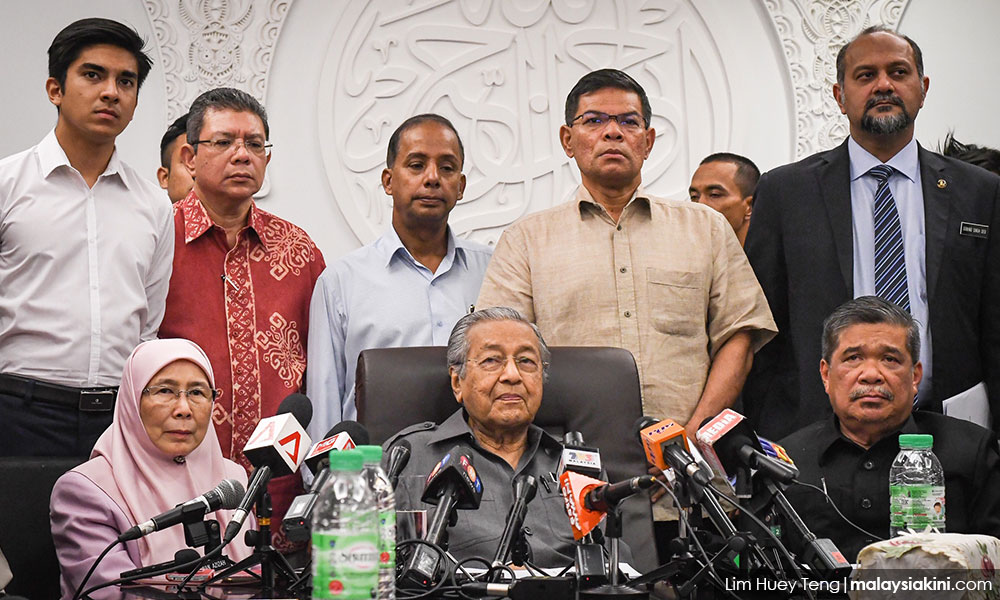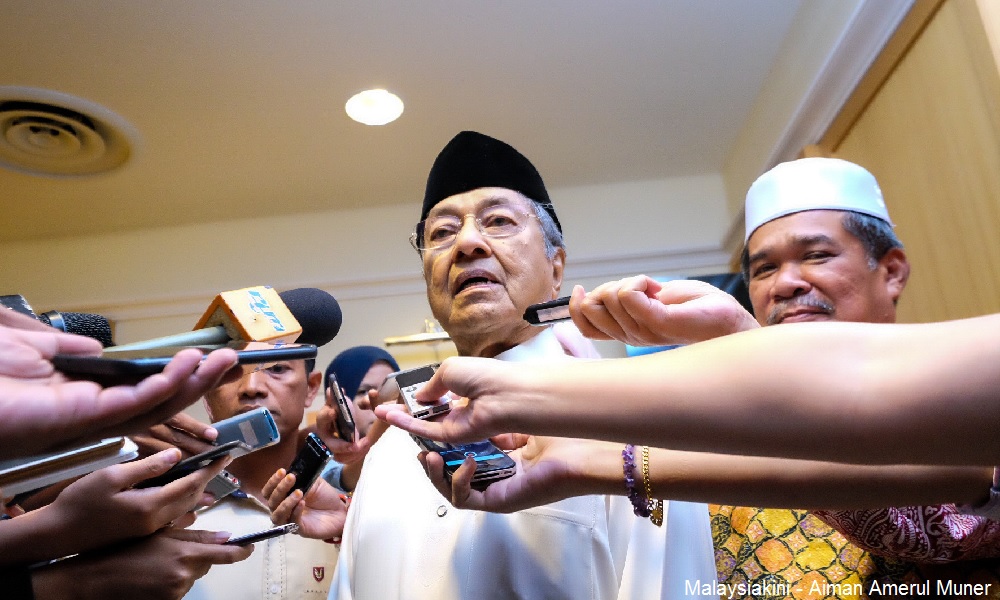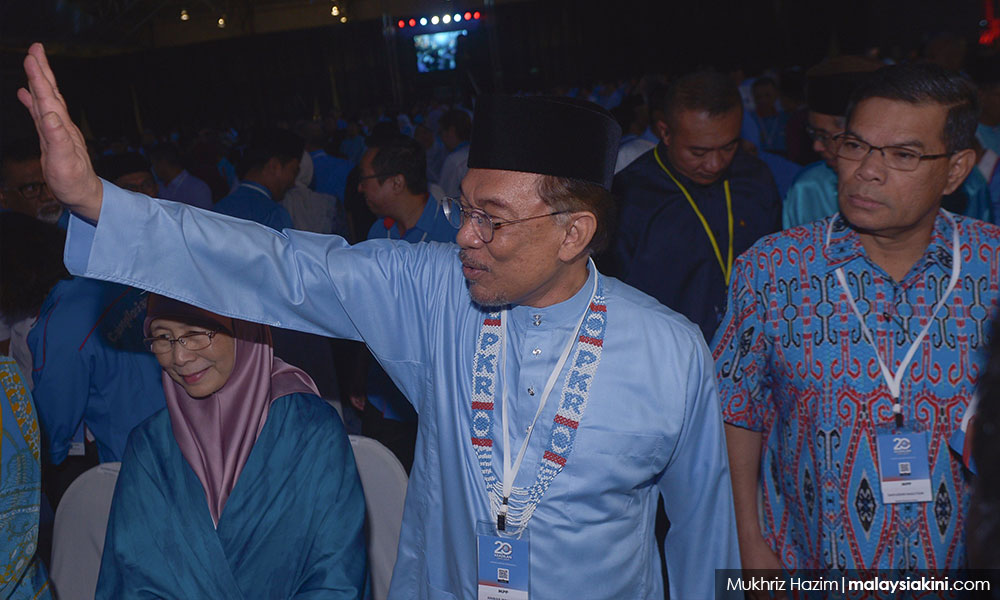COMMENT | Having been a keen student of history and an active participant in the nation’s politics for some time already, I sensed a historic turning point was reached in the statements by Anwar Ibrahim on Feb 13, 2020, and Dr Mahathir Mohamad on Feb 14, 2020.
Finally, clarity is emerging on the question of leadership, and that should go a long way in setting everything else in proper order.
Mahathir and Anwar met on Feb 13 and agreed upon the former handing over the premiership to the latter after the Asia Pacific Economic Cooperation (Apec) summit.
When asked by the press, Mahathir confirmed Anwar’s account of the gist of the meeting and also reiterated that while there were leaders attempting to alter the situation, for example, by enlisting the support of Umno and PAS, he was not involved.
In jest, Mahathir said there were people trying to get him to lead for another 22 years, despite him approaching his 95th year.
The alignment in 2017 between Mahathir and Anwar, as well as the forces aligned to them, was not something easily achieved.
It could be done because it was necessary and essential for the removal of the kleptocratic government of Najib Abdul Razak.
Najib had taken Anwar out of the political equation by sending him to prison on Feb 10 2015. He assumed that removing the opposition’s prime ministerial candidate and bringing PAS to his fold would assure him of victory in the general elections.
In Najib’s racial calculus, selling the idea to the Malay constituents that the Pakatan Harapan coalition was in fact dominated by the DAP would be sufficient for him to win, almost by default.
In 2016, Mahathir changed the political equation by doing the improbable, the incredible, the unthinkable:
- He left UMNO in February;
- He engaged new potential partners through his Citizens’ Declaration in March that year;
- After defeats for the opposition in the twin by-elections of Sungai Besar and Kuala Kangsar in June, Mahathir understood the necessity to form a political party to rally his supporters and to align his new movement to Pakatan Harapan;
- Just days before the launch of Bersatu on Sept 8, Mahathir met Anwar when the latter appeared at a courthouse to signal the need for reconciliation for a greater cause. It was their first meeting in 18 years since Sept 2, 1998;

The alignment between Bersatu and the original Harapan parties (PKR, Amanah and DAP) was a gruelling experience that took more than a year to complete. This was mainly for three reasons:
First, the collective distrust and antipathy of the original Harapan parties towards Mahathir and, to a certain extent, vice versa, was a serious hindrance;
Second, because Najib, Umno and PAS were painting the DAP as the bogeyman to scare off Malays from supporting Harapan, a lot of courage was needed from everyone in the coalition to accept the idea that an expanded Harapan was the most promising path to electoral victory;
Third, some Harapan leaders did not really believe that a multiethnic coalition that included the DAP could overcome racist onslaughts from PAS and Umno; and thus they sought to forge a coalition with PAS despite strong evidence that the latter was already working in concert with Umno.
To his credit, Mahathir was already advocating full alignment with Harapan as early as Nov 2016 when other leaders in Bersatu were still toying with the idea of founding Barisan Rakyat as a Bersatu-Harapan joint entity.
No doubt Bersatu and Harapan did ink a Memorandum of Understanding in Dec 2016, but the thinking on the part of Bersatu leadership was still not conclusive.
By Feb 2017, Muhyiddin Yassin and Mukhriz Mahathir came to the conclusion that there was no point in talking to PAS anymore. They agreed for Bersatu to come into full alignment with the original Harapan parties.
After Bersatu officially joined Harapan on March 27, 2017, the coalition took another four months to decide on formalising a Mahathir-Anwar joint leadership set-up.
This happened on July 14, 2017. I think of this as a major turning point in Malaysian history.
Months of negotiations followed, and on Jan 7, 2018, Pakatan could finally announce that Mahathir would be the candidate to become Malaysia’s seventh prime minister, and Anwar would be the eighth. It was this agreement that paved the way for eventual electoral victory.
The projection of Mahathir and Anwar as seventh and eighth PMs respectively was officially mooted at the Harapan retreat held on Dec 1-2, 2017.
Although one faction in PKR was opposed to the idea, Anwar did not. Instead, he set the condition that PKR would contest in more seats than Bersatu on the peninsula. This, he felt, was necessary to protect PKR’s political interests and to fend off accusations from internal rivals that he was selling out.

No date was set for a transfer of power from the seventh to the eighth prime minister.
Negotiators from the four parties spent long days and nights until Jan 6, 2018, to stitch a deal together. At 6pm on Jan 6, there was still no deal.
Of the 165 parliamentary seats in the peninsula, there was a deadlock in negotiations on four seats.
The understanding was that if no deal could be reached that day, the Harapan convention planned for Jan 7 would not proceed. Had that turned out to be the case, the history of the country would have gone down a totally different path.
Fortunately, at 8pm on Jan 6, a deal was reached. Amanah agreed to make key sacrifices.
As a participant at each juncture of the development described above, I do believe that when it comes down to the crunch, the leaders involved would choose the best course for the nation.
For instance, one very honourable man is Muhyiddin Yassin.
He was former deputy prime minister and he could have insisted on being the prime ministerial candidate.
But understanding that a Mahathir-Anwar joint ticket was crucial to the alignment between Bersatu and the original Harapan parties to have maximum impact, Muhyiddin had very early on (around mid-2017) made known to many that he did not want that role.
What he wanted was simply for Harapan to win and to defeat Najib. For this, I hold great admiration for Muhyiddin.
Following the May 2018 general elections, the leadership was bogged down by the daily chores of governing.
Very few could explain to the public that Harapan is a coalition of impossible allies and of former sworn enemies who had come together to rise to the needs of the nation. They had been putting nation above self, duty above personal interests.
All in all, the Harapan parties were far from effective in making supporters understand the new form of a coalition government that Pakatan Harapan amounts to.
It is in fact, a very young coalition. More than that, it is more like a corporation with four stakeholders, each owning 25 percent of the shares.
Keeping various individual ambitions at bay in such a situation is hard enough, and one can easily imagine how complicated communication between the stakeholders can get.
Admittedly, some had gotten the idea into their heads that if they changed the equation enough, their influence and power could increase beyond 51 percent of shares.
They imagined bringing Umno players in, either Hishammuddin Hussein’s faction or Ahamd Zahid Hamidi’s (below) faction, or both, even if these two do not see eye to eye. Also, PAS could come in at some point.

For this strategy to work, and to have any chance of upsetting the Mahathir-Anwar agreement and stop Anwar from becoming prime minister, DAP and Amanah would have to be kicked out.
Attempts in that direction were made in October 2019, aimed at sidelining and neutralising the DAP and Amanah.
For the nation to move forward, we will need to:
- Build trust at the top to avoid further confusion. Whenever a void or gap appears at the top, there are bound to be elements who will attempt to change the situation for their own ends. Anwar’s supporters will need to trust Mahathir on his commitment to the transition while the latter’s supporters will need to help ensure that the transition does take place.
- Recognise that without Mahathir’s coming out against Najib and changing the entire game, there would not be a Harapan government. Without Anwar struggling persistently for a new Malaysia over the last 22 years, since September 1998, Mahathir would have no one to align with in 2016 when he finally came to admit that Umno and Najib had gone too far.
- Accept that the Harapan government is a Mahathir-Anwar government and an Anwar-Mahathir government, and given that it is a coalition government, the Harapan prime ministers should not even try to follow the model of the “winner-takes-all” prime ministers of Barisan Nasional which had plagued the nation for so long.
Learning from history, we should note that clashes between supporters, as seen in 1998, ultimately leads to clashes between principals.
This is a socio-political dynamic that we should avoid, or at least minimise.
Abdullah Badawi was also misguided in 2003 to delete or expunge Mahathir’s deeds. Erasing history is counterproductive.
The statements made by Anwar on Feb 13 and by Mahathir on Feb 14 would be further strengthened if the Harapan leadership as a whole can provide certainty on the following:
- The role of Mahathir beyond transition;
- More involvement of Anwar in governing from now on to smoothen the transition;
- Clarity on who Anwar’s deputy will be. This will provide reassurance to all parties that the coalition spirit is upheld.
In 1998, when the titans fought, the nation went down with them and has stagnated ever since.
The grand coalition that managed to defeat Najib, Umno and the BN, provides an opportunity rarely found in human history: to reconcile, to heal and to do great things together.
Fatefully, the longevity of the key protagonists makes this possible.
Finally, when the centre consisting of Mahathir and Anwar continues to hold, then everything else will continue to fall into place. Such certainty will lay the foundation for Malaysia to build a great nation for all in the next decade and beyond.
LIEW CHIN TONG is the deputy defence minister and DAP national political education director.
The views expressed here are those of the author/contributor and do not necessarily represent the views of Malaysiakini.

